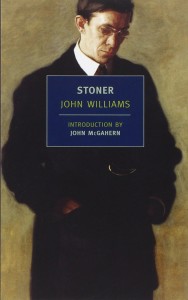 I realized recently that this year marks the fiftieth-anniversary of the publication of John Williams’s novel about English departments and heartache, Stoner. I read it a few years back, but it would be an opportune moment, I feel, to revisit it, and to share my path back through the novel here.
I realized recently that this year marks the fiftieth-anniversary of the publication of John Williams’s novel about English departments and heartache, Stoner. I read it a few years back, but it would be an opportune moment, I feel, to revisit it, and to share my path back through the novel here.
Stoner is one of the more remarkable cases of resurrection in U.S. literary history. Reprinted by the NYRB Classics in 2003, it has slowly attained a cultic following and quite robust sales (I would imagine that its success underwrites many of the slower-moving titles in the NYRB Classics series), along with lavish praise that pierces quite obviously beyond typically promotional.[1] You can see evidence of that devoted admiration on this page advertising a special (sale-price) 50th anniversary edition at the NYRB site. “John Williams’s Stoner is something rarer than a great novel—it is a perfect novel, so well told and beautifully written, so deeply moving, that it takes your breath away,” Morris Dickstein says, by example.
My schedule is:
- 11/9: Chapters I-V (pp. 3-87)
- 11/23: Chapters VI-XII (pp. 88-194)
- 12/7: Chapters XII-end (pp. 195-278)
Please join me!
[1] “There is the review intended to sell a book,—which comes out immediately after the appearance of the book, or sometimes before it; the review which gives reputation, but does not affect the sale, and which comes a little later; the review which snuffs a book out quietly; the review which is to raise or lower the author a single peg, or two pegs, as the case may be; the review which is suddenly to make an author, and the review which is to crush him,” says Trollope in the most thorough categorization I have read. (The Way We Live Now, Chapter XI)

3 Thoughts on this Post
S-USIH Comment Policy
We ask that those who participate in the discussions generated in the Comments section do so with the same decorum as they would in any other academic setting or context. Since the USIH bloggers write under our real names, we would prefer that our commenters also identify themselves by their real name. As our primary goal is to stimulate and engage in fruitful and productive discussion, ad hominem attacks (personal or professional), unnecessary insults, and/or mean-spiritedness have no place in the USIH Blog’s Comments section. Therefore, we reserve the right to remove any comments that contain any of the above and/or are not intended to further the discussion of the topic of the post. We welcome suggestions for corrections to any of our posts. As the official blog of the Society of US Intellectual History, we hope to foster a diverse community of scholars and readers who engage with one another in discussions of US intellectual history, broadly understood.
Andy, are you using the 50th anniversary edition, or the edition pictured above? Could you post an ISBN number?
I’m told by the NYRB Classics people on twitter that the pagination is different. I’ll be reading the paperback edition (pictured above), but if folks have gotten the hardcover, I’ll just cite chapter numbers for any quotations.
The NYRB Classics edition is also available as a Kindle e-book (and an audiobook from Audible). The e-book does not have page numbers fwiw.